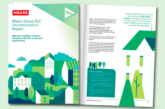Wider adoption of the real Living Wage could provide an economic boost worth tens of millions of pounds to Greater Manchester’s economy, according to new research published as Living Wage Week 2022 gets underway.
Research commissioned by the Living Wage Foundation and conducted by the Smith Institute, the Local Living Wage Dividend, found that if just a quarter of those earning below the real Living Wage saw their pay raised to that level, the increase in wages, productivity and spending would deliver £72m back into the Greater Manchester economy.
With households across the UK facing a cost-of-living crisis, and economic growth stagnant, the research shows how the real Living Wage can help tackle both while supporting a high-growth, high-wage economy.
Businesses that adopt the real Living Wage report a range of short-term and long-term benefits, including an improved ability to attract and retain staff, a boost to their employer brand, and better staff morale.
The research comes as Living Wage Week 2022 gets underway. The annual celebration of the Living Wage movement begins with a special event today (Monday 14 November) hosted by the Living Wage Foundation at the Octagon Theatre in Bolton.
Andy Burnham, Mayor of Greater Manchester, said: “In a cost-of-living crisis, the campaign for fair pay is more vital than ever. But paying the real Living Wage isn’t just the right thing to do for workers – it benefits businesses, helping them attract and retain staff, and boosts our economy too. When wages are higher people have more money to spend in their local economy, stimulating growth which benefits everyone.
“Living Wage Week provides an opportunity to celebrate the progress we’ve made and look forward to the challenge ahead. We remain committed to ensuring everyone working in Greater Manchester receives a fair day’s pay for a fair day’s work.”
The improvement of employment standards in Greater Manchester is being driven by the Good Employment Charter, a voluntary membership and assessment scheme. Membership is based on a range of criteria, including paying the real Living Wage.
Since being named the UK’s first Living Wage City-Region during last year’s Living Wage Week, Greater Manchester has continued to make progress towards the goal of all jobs paying the real Living Wage by 2030.
Earlier this year the Octagon Theatre became the 500th Living Wage Employer in Greater Manchester.
The number of Living Wage Employers in Greater Manchester now stands at 530 – up by more than a third since last Living Wage Week. The city-region was recognised as a trailblazer for the Living Wage movement at this year’s Living Wage Foundation’s Living Wage Champions awards.
Cllr Bev Craig, Leader of Manchester City Council and GMCA Portfolio Lead for Economy and Business, said: “The movement for fair pay and good employment practices continues to build momentum in Greater Manchester. With a growing number of businesses making a simple commitment to pay the real Living Wage, the movement is having an increasingly positive impact on our city-region’s economy, which in turn raises living standards and prosperity for everyone.
“The Greater Manchester Good Employment Charter is there to provide support for employers who want to commit to fair pay and better conditions for their staff. If you want to get involved, contact the Charter team to find out more.”
Lou Cordwell, Chair of Greater Manchester Local Enterprise Partnership (GM LEP), said: “This research complements everything we already know about the business case for paying the real Living Wage. Fair pay is the foundation for building the kind of economic growth we want to see in Greater Manchester.
“Businesses who adopt the real Living Wage enjoy a range of long-term benefits. It also helps businesses deal with some of the immediate challenges they face, like gaining an edge in an increasingly competitive recruitment market. Most importantly, people on the lowest incomes get a level of financial security, which helps them play a more active part in their local economy.”
Katherine Chapman, Director of the Living Wage Foundation, said: “Paying the real Living Wage isn’t just the right thing to do for workers, it’s good for business and the wider local economy too.
“In the midst of unprecedented economic times, paying the real Living Wage both tackles in-work poverty and provides a vital economic boost to the UK economy.
“With the cost of living rising, it’s never been more important for employers who can, step up and provide a wage based on the cost of living, joining over 11,000 Living Wage Employers across the UK. In doing so they’ll not just provide security and stability for their workforce, but they will boost the local economy too.”
Header image ©jjfarq/AdobeStock









